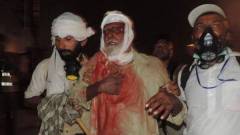Backed by parliament and many political parties, Sharif has refused to step down as negotiators tried to convince Qadri and Khan to end their protests
Thousands of anti-government protesters tried to raid the official residence of Pakistan’s prime minister, sparking clashes with police that killed three people and wounded nearly 400 amid cries for the premier to step down, officials said yesterday.
The overnight violence has raised the stakes in the two-week sit-in led by opposition politician Imran Khan and fiery cleric Tahir-ul-Qadri, which earlier saw demonstrators march past roadblocks to set up camp outside of Pakistan’s parliament. They demand Prime Minister Nawaz Sharif step down over their allegations of massive voting fraud in the election that brought him into office last year.
Backed by parliament and many political parties, Sharif has refused to step down as negotiators tried to convince Qadri and Khan to end their protests.
When the crowd started removing shipping containers used as barricades, police fired salvoes of tear gas that forced the crowds back. Authorities said they had no choice but to use force.
Islamabad police chief Khalid Khattak said protesters were armed with large hammers, wire cutters, axes and even a crane.
The protesters started regrouping at daybreak yesterday and made repeated attempts to make their way through heavy deployment of police and barricades to reach the premier’s residence. Police strengthened their lines and responded by lobbing tear gas canisters.
Nearly 400 people — including women, children and police officers — were admitted to local hospitals, officials said. The injured had wounds from tear gas shells, batons and rubber bullets, said Dr Javed Akram, who heads the capital’s main hospital.
One person drowned in a ditch after he was in a crowd bombarded with tear gas while two others died from wounds related to rubber bullets, said Dr Wasim Khawaja, a senior official at the hospital.
Police also beat local journalists covering the protests with batons, injuring some, Railways Minister Saad Rafiq said. Rafiq said he intervened to stop the police assault and said that he would ask the government to investigate the officers’ conduct.
The protests began with a march from the eastern city of Lahore on Pakistan’s Independence Day on August 14.
Khan described the police action against the crowd as illegal. Qadri said he’d been up all night praying for a resolution.
“If they think their brutality will force us back, they are wrong,” he said in a choked voice.
The demonstrations signify the starkest threat to Sharif’s third term as prime minister. His previous term ended with a military coup and his eventual exile. Sharif vowed Saturday he would not step down.
“The biggest question: Can Nawaz Sharif survive? The answer, in these frantic hours, must surely be a miserable, despondent no,” read an editorial in Dawn, one of the country’s leading English-language newspapers.
Source: Dhaka Tribune










